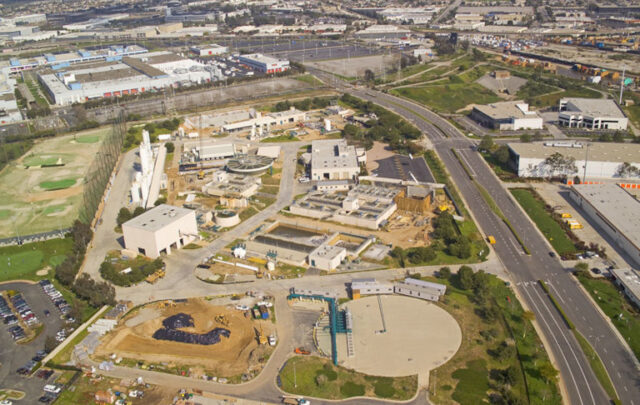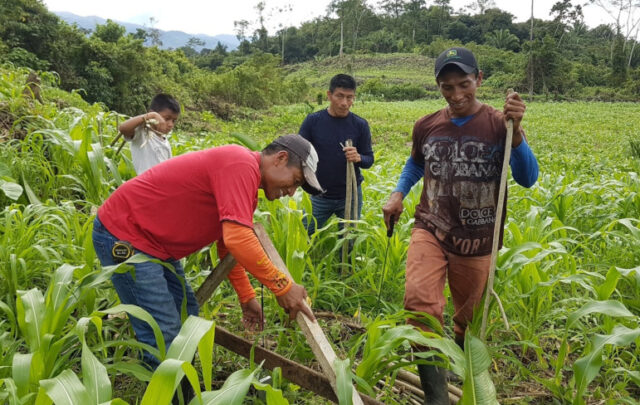The following is the prepared text for a talk I gave in the city hall of Eugene Oregon the evening of Feb. 17, 2010. It was organized by two Lane County commissioners and the city mayor and is part of a series on Food Security. My role was to discuss food security in the context of peak oil. This speech is similar to one I gave last year that was also posted on The Oil Drum. At the end I recommended people look up The Post Carbon Institute and affiliates for good leads on what ideas and actions are happening in response to our predicament.
My presentation has 4 parts. First, I will connect what is going on in the economy right now with natural resources and the environment. Second, I will explain why oil is an especially important resource and what is meant by peak oil. Third, I will discuss the implications of economic decline and peak oil for the food system. And fourth, I will suggest what families and society can do given our predicament.
The Economy and Mother Nature
I want you all to imagine Mother Nature, in the personified sense. Now, and I realize this may be a stretch, think of her also as a banker, perhaps a matronly Ben Bernanke. Got that image in your head? Okay…
Several generations ago our forefathers walk into “Bank of Nature” and get a loan. Mother Nature approves our loan and offers us plenty of credit. Our ancestors are now endowed with the riches of ancient forests, prolific fisheries, fertile topsoil, clean water, concentrated mineral ores, vast reserves of fossil fuels, and a splendidly stable climate. These assets, Mother Nature’s credit slip, are the source of our wealth and comfort. Every widget, gizmo, thing-a-majig, do-dad, wach-a-macall-it and Winnebago produced in our factories, sold in our stores, stuffed in our closets, piled in our landfills and spilled in our waters originated as a loan from Bank of Nature.
Why are we having economic troubles? Because loans, as we are now discovering, are not just slips of credit, they also come with debt. While we gleefully liquidated the Natural Capital loan Mother Nature approved for us, we failed to develop a business plan that could pay back the debt. This ecological debt is the underlying drag on our financial system.
What this means, practically, is that as soon as the economy tries to heat up again, which we like to call increasing DEMAND, it will be capped on the knees by the henchmen Mother Nature hired. She will not extend us any more credit since we have done a poor job with the first loan. If you are unclear about what I mean here, I’ll explain this a bit more when I talk specifically about oil.

I have seen pictures of some great protest signs over the past couple of years that state this very succinctly: Nature doesn’t do bailouts. This is why the current policy of all central banks and governments to deal with the financial crisis, which is to essentially create and inject more money into the system, has no chance of success. More money doesn’t solve an ecological debt crisis, because money is a claim on resources and not worth anything by itself.
Oil is Special
Okay, now I want to highlight the special role of oil in our economy.
Over the recent decades, we have built what is called a “globalized economy” where materials, labor and services are readily exchanged across the globe. This feat has only been possible due to cheap oil. The “cheapness” is key. Transportation costs are assumed to be only a small part of doing business.
Some economists have calculated what is called the Goldilocks Zone for oil prices. Below $70 per barrel and it makes no sense for oil companies to explore and develop new supplies, while prices above $80 per barrel lead to a curtailing of demand, basically cutting off prospects for U.S. economic growth. And as mature oil fields deplete, the price to explore and develop new oil wells goes higher than $70 per barrel, essentially locking the U.S. into economic stagnation.
Step back for a moment and think about how potent and special oil is. Oil is highly energy dense and easily portable. A gallon of oil contains enough energy to do the work of hundreds of people simultaneously or a single person for hundreds of hours. You can drive a 4000 lb car at great velocity for tens of miles on a gallon of gasoline. Try pushing a car that distance (but before doing so, ask your doctor if that’s okay).
So when you hear the term peak oil, what does that mean? Peak oil is simply the point in time when the global supply of oil stops growing. Peak oil is not a theory, but an historic fact for 2/3 of oil producing countries, including the United States, which peaked in 1970.
What we experience is less supply leading to a spike in prices. High oil prices then choke off economic growth because our globalized economy is structurally reliant on cheap oil. And without economic growth loans are not paid back sufficiently and a financial crisis ensues.
This is essentially what happened between 2005 and 2008. We had a credit bubble because of lax lending policies PLUS a flattening of oil production at the same time.
Connecting to Food Security
Okay, so what does this have to do with food security?
- Globalization and cheap energy led to the development of centralized processing and distribution channels, with what is termed “just in time delivery systems.” The typical grocery store, for example, only has a 3 day supply of food on the shelves, and relies on daily trucking from distance warehouses to restock basic supplies. An oil supply shock would disrupt getting food to stores.
- Because of cheap and reliable transportation, it has been possible for entire agricultural regions to become highly specialized in production for export. So the Willamette Valley evolved into a grass seed capital, which replaced a diversified farm economy that contributed significantly to local consumption. Since we no longer have the local farms feeding us, we depend on global trade for basic sustenance.
- Farming methods themselves rely on cheap energy, such as tractor fuel and imported fertilizers. Beyond the farm energy is used extensively in processing, distribution, storage and cooking. All told, about 7 calories of fossil fuel go into each calorie of food we eat.
- Modern farming is highly connected to the financial system. A depressed economy makes credit scare. Many farms that are in debt and require bank credit to operate will likely go out of business. And some financing is going to be needed to help farms restructure for the transition towards new crops, new methods, and new markets.
What to Do
This brings me to the question of “What to do?”
I’ll first address this towards individual persons and families. As energy flows to society decline, our social systems will become less complex structurally, but our daily lives more complex. What I mean by this is that we will become less of “specialized cogs in a big machine” and instead have to take on more diverse, practical, and flexible roles.
The kinds of work we do will shift too. Consider whether you specialize in a “nice to have job” or a “need to have job”. Jobs are going to be more and more about securing basic needs, such as food, water, shelter, health, and security. Fewer paid jobs will be available. This will require people to rely more on the informal economy, which means getting paid through reciprocal exchange relationships. Start by getting to know your neighbors, joining social networks, and developing a few basic skills, such as gardening, bike repair, and inexpensive health care.

This all may sound extreme, but it is already the reality for a growing subpopulation of tens of millions of Americans, and most of the 6.7 billion humans on the planet.
Now I’ll talk about what I’d like to see society do. Instead of thinking about policies and programs, I will talk about values and paradigms.
Primarily we need to recognize that the environment is our primary form of wealth. Bank of Nature, not Goldman Sachs or the Federal Reserve, is our master. It is far more important for us to pay back our ecological debts since these are non-negotiable, whereas financial ones are among people and can be forgiven. If you manage public funds, always ask whether allocating money is going to rebuild natural capital or further its liquidation.
I’d like to see community leaders ask people to consider themselves as contributors rather than consumers. The whole consumer identity should become passé. We will thrive by creating an ecological identity, which is a deep appreciation for our relatedness and absolute interdependence with other people, other forms of life on this planet, and the fundamental forces of sunshine and geology.
What I have said may provoke anxiety, and is certainly an immense undertaking, but ultimately we have no choice so let’s not whine and delay. Let’s take it on as a great adventure, a thrilling challenge. Our success or failure is going to hinge on our attitude. We need to take control of the circumstances and become active participants in transition. I can assure you that doing so is tremendously energizing, healthy, and rewarding in so many ways.
 This work is licensed under a Creative Commons Attribution-Share Alike 3.0 United States License.
This work is licensed under a Creative Commons Attribution-Share Alike 3.0 United States License.





